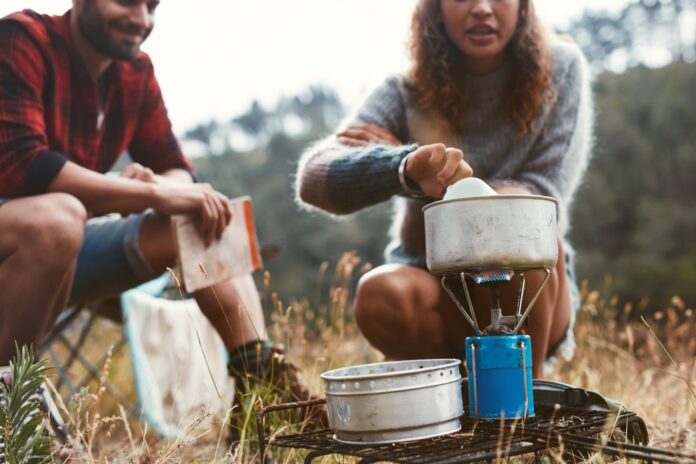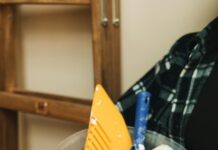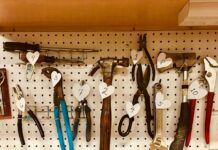- A kitchen expert has revealed the common cooking technique that campers are prone to – despite it posing a high risk of food poisoning
- Brits often prepare their raw meat products on a plate or board and bring them to their BBQ or fire – before returning the cooked meat to the same surface
- Campers attending an event, such as Leeds Fest, may grow complacent as the day progresses, data shows, with accidental fires 124% more likely to occur between 4 pm and 8 pm
- Other cooking mishaps include allowing meat to stand out without refrigeration, for those who don’t have cooler boxes, and reusing contaminated implements
A kitchen expert has revealed the common mistakes most Brits will make when camping this summer – which can increase the risk of food poisoning, and even cause fires.
Mert Yashar, Director at House of Worktops, says that it’s easy for many of us to forget essential kitchen safety tips while celebrating the warm weather, but with data showing that food poisoning cases rise in the summer months, it’s important to stay on the ball.
According to the Food Standards Agency (FSA), there are 2.4 million cases of foodborne illness a year, and the risk rises in summer as the warm weather boosts bacterial growth.
Add to this that nationwide Google searches for ‘food poisoning symptoms’ rose by 60% in June alone, and prioritising safety is especially key over festival season, in order to avoid attendees having to seek medical help.
Mert says: “As we’ve already enjoyed some high temperatures over the last month, it’s likely some of our friends and family have plans to head camping before summer draws to a close – whether that’s at the beach or when attending a music festival. And while it’s practically a British summer staple to fire up the grill when out and about, the fact is that many people will start to let their food safety standards slip once the good weather kicks in.
“The most easily-avoidable mistake that many make is laying out their raw meat in an easy-to-grab fashion on a chopping board or plate, which they then carry to the grill, disposable BBQ or open fire. They then place the cooked products back onto the same surface to be transported back inside their tent or caravan, or to another outdoor table where condiments, garnishes, and guests are waiting.
“Just because the meat has been cooked doesn’t mean it’s safe to place it on a surface that’s previously held raw meat, as this will cause contamination. And it’s easy to forget this, as you’re likely preoccupied with not burning the meat or yourself on the grill.”
The expert reveals that this preoccupation can result in other essential safety tips being overlooked, as Brits will have to juggle cooking and entertaining their guests in a social setting.
Mert adds: “It’s all too easy to lose track of time when attending any event, but especially one that’s very social and based outdoors. Other common mishaps that occur include leaving raw meat unrefrigerated for an extended time while waiting for the grill to heat up – especially if you don’t have a cooler box – not keeping side dishes covered to protect them from bacteria or bugs, and rushing to take the meat off the grill before it’s ready to free it up for the next batch of meat.
“Hosts can even find themselves reapplying the same marinade they’ve placed raw meat in to baste the cooked meat on the grill – just before serving it to their unsuspecting guests.”
But it’s not just food contamination that being distracted or lazy can lead to, as barbecues reportedly account for around 1,800 accident and emergency visits yearly – most of which (44%) are for burns, while 1 in 10 visits are due to cuts from sharp objects.
According to the Royal Society for the Prevention of Accidents (RoSPA), most grill-related accidents happen in a home setting (78%) instead of a public place, and the likelihood of injury increases considerably as temperatures rise.
As temperatures rise throughout the day and the grill has been used successfully, hosts may become complacent around fire safety – especially if they drink alcohol while cooking, or have been out in the sun at a festival all day.
Figures on domestic fire incidents from the Home Office support this, as an accidental fire is 124% more likely to occur between 4 pm and 8 pm than any other time. Outdoor fires are also 10% more prevalent in June and July than in May or August.
But there are some easy ways to prioritise fire and food safety at your next event, House of Worktops reveals, as long as you remember the following advice:
- Keep your raw and cooked meat utensils separate. Using different plates and tongs for raw and cooked meat ensures cross-contamination can’t occur. If you’re working with limited containers, place cooked meat directly onto your guests’ plates so that the board or plate is only used to bring raw meat to the grill. Make sure to use hot, soapy water to wash anything that raw meat has covered thoroughly.
- Make sure your meat and side dishes are covered. While it’s tempting to put on a spread and then turn all of your attention to the grill, it’s much safer to keep your side dishes covered with foil or clingfilm right up until you need to use them, to avoid any bugs or bacteria sneaking in. You’ll also want to keep your meat refrigerated as much as you can until the grill has heated up – unless the product says it needs to reach room temperature first.
- Avoid placing hot dishes on cold and wooden surfaces. Not only can placing hot dishes on your countertops cause blistering or burning but it can also make it harder for your guests to keep track of which containers are too hot to touch. Place glass or metal dishes on a wooden chopping board or cooling rack so that it’s easier to distinguish, and so you avoid damaging your kitchen surfaces.
- Make sure your grill is clean before firing it up. The best time to clean your grill is immediately after it’s heated but before you start cooking again, as this will make it easier to get grease off and ensure you’re not contaminating food. Brush off the grates and racks once they’re cool with a wire brush, scraper, or scourer, and keep an eye out for any debris that may fall onto the hot coals while your food cooks.
- Keep a bucket of water or sand nearby. Your fire should ideally be set at least 10 feet away from your house and should have a bucket of water or sand close by for emergency extinguishing. If your grill uses gas, don’t use water and instead opt for sand or salt, as water on a grease fire can cause a flare-up. Make sure to close the lid once adding your water/sand to help starve the fire of oxygen.
With festival season in full swing and temperatures picking up after a few weeks of rain, it’s key that Brits ensure they avoid cooking outdoors in the sweltering heat unless following safety precautions, as dry grass also increases fire risk – especially with flammable tents in close proximity.
Help keep news FREE for our readers
Supporting your local community newspaper/online news outlet is crucial now more than ever. If you believe in independent journalism, then consider making a valuable contribution by making a one-time or monthly donation. We operate in rural areas where providing unbiased news can be challenging. Read More About Supporting The West Wales Chronicle






















